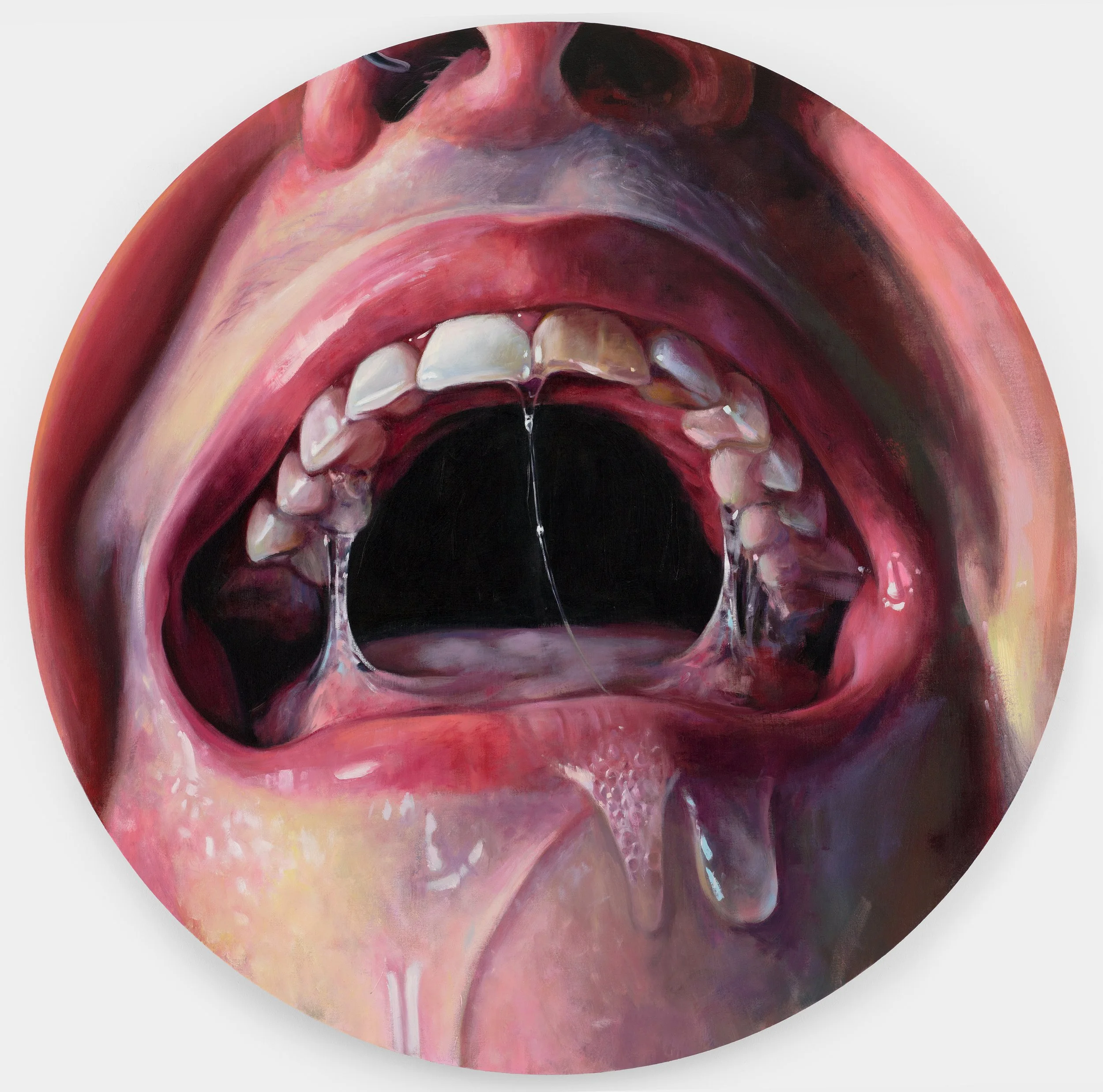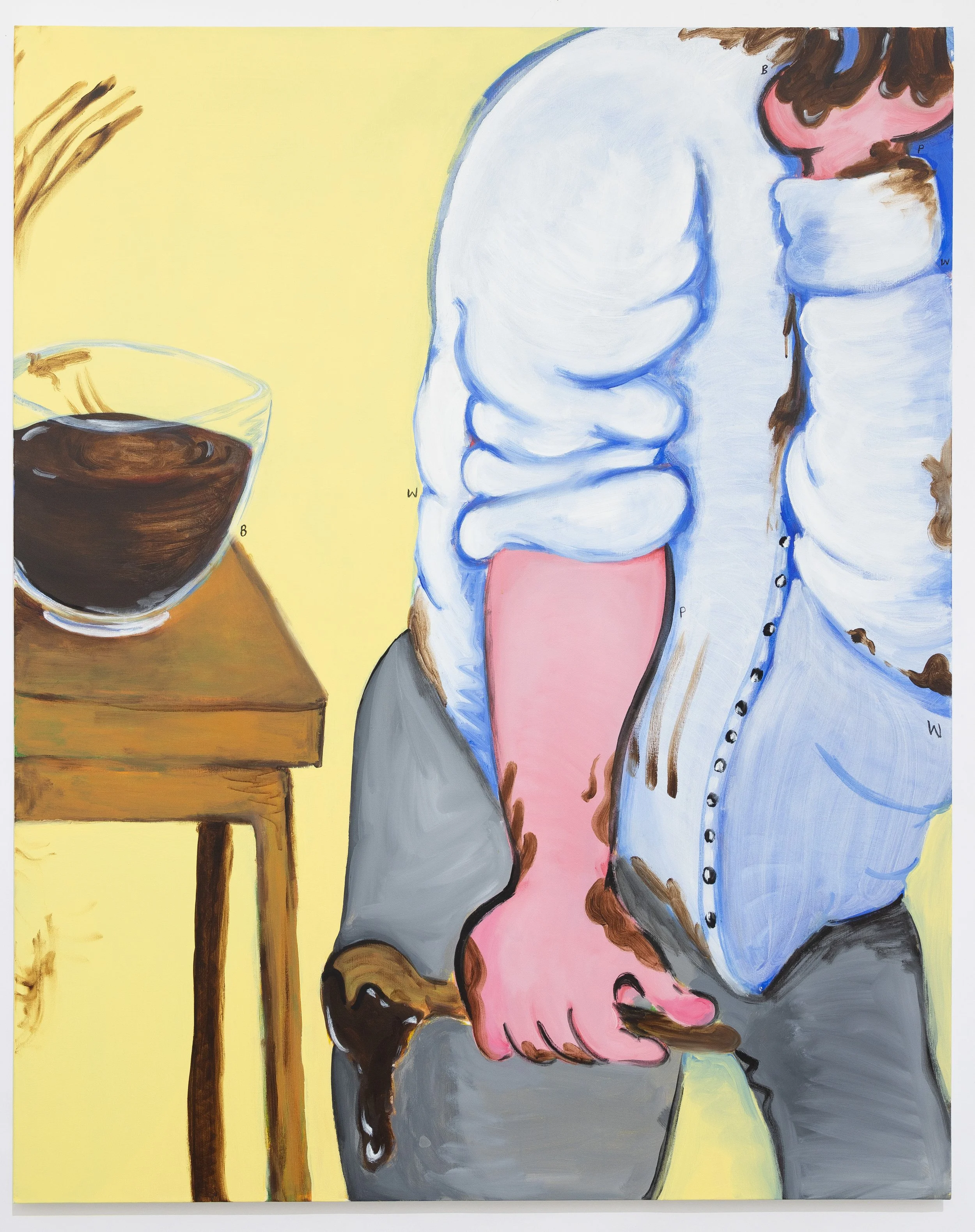Artists Lydia Pettit and Olivia Sterling in Conversation: On Self Portraiture, The Void and Bitches In Heat
Words: Gina Tonic
Make it stand out
From their first discovery of one another’s work at the Royal College of Art in 2020, Lydia Pettit and Olivia Sterling felt destined to show their work together. Both (mainly) painters who explore the body in their work - although inarguably, very different ways - it’s taken four years to pull together their joint show Bitches In Heat.
As well as working together on the dog themed exhibition, Sterling and Pettit have had stacked schedules this year, with Sterling currently participating in the A Feast For The Eyes group show Guts Gallery and Pettit’s short film, The Body which will be shown at The Amory Show in September, has been making waves for its mastery of horror to explore complex themed of corporality and trauma. The two artists joined us in our studio to discuss their different takes on horror, fat representation and dog metaphors.
Lydia: The first time we met, we had an instant mutual respect for one another. My first impression was Olivia was extremely confident in the fact that she was making these whimsical, cynical paintings that were not about representation explicitly. You were using paint in the way that best suited you, and to do that especially at your age - because you were 21 when I met you - requires a degree of confidence and understanding of what art is for you. I thought that was really impressive.
Olivia: I was in a particularly vengeful, angry show at the time called Manslaughter and I think you identified with it. I was trying to parse my - almost - addiction to male validation, turning it into something edible that I could destroy, and that often is symbolised by an archetype of the most powerful person, i.e. a rich white, straight man. That just felt incredibly funny to play with.
Lydia: I loved how you were using tomatoes as a way of simulating blood and gore and violence and, obviously, literally eating the flesh of a man. My work is very horror first, humour second, but yours is humour first, horror second. I think your work is so tongue in cheek, and really exists in the realm of absurdity in a way that I really admire and envy, because I feel very devoted to representation as a sort of naturalism. That's the way that I make work and I've accepted that, but I do appreciate people who can summon imagery in the context of like political cartoons, and caricature, and reuse the history of that type of imagery, to speak about their own perspectives. I also just like that you paint a lot of food and fat people and explore the fixation between the two.
Olivia: Well, I like your paintings because they're bloody good paintings! I really enjoy paintings that are Bacon-esque, a painterly figure on top of a flat ground, and I also really like the voidscape that you make within your paintings. I feel like when we look at your paintings, it looks like you're talking to yourself in this sort of void. You can really see that in the film that you made - the void suddenly turns white, and you suddenly become alive.
I really enjoy the universality of your paintings, because it allows us to pour ourselves into the scene that you're making. And so, imperatively, I feel like it's really helpful for us to take one part of ourselves and literally stab it until we can take ownership of it again, or we can defeat it in some way. I think that's very powerful.
Lydia: I told myself a long time ago,’It's okay to not know why you're doing something.’ And I just had this urge to create this film where I physically embodied this slasher character that I had painted and attack myself. I don't know why I wanted to do it but it was an incredibly cathartic experience. In the end, because it's formless in concept in many ways, it's easier for people to input their own experiences into those visuals. I ended up realising that I held a lot of hatred for the way that I looked at myself, which isn't even my own. But also, I wanted to give an opportunity for anger to take the forefront because it's something that I never grew up expressing. And when you don't express anger, it becomes something much more sinister than it would have been if you had coped with it in the moment. So in The Body, I wanted to see, ‘Okay, what if I just embody this singular facet of myself? What would happen?’ And as you can see, in the film, we are not two dimensional beings and I couldn't really maintain that sort of coldness and violence through the duration of the performance.
Olivia: It might be a pop psychology thing but I think this work really embodies the way that women internalise their anger and men externalise their anger. But the show, Bitches In Heat, that we're making, marks a change I think. You're outstretching and coming into the world. I feel like my work is never internal and always outwardly exploring the outside stuff that impacts us.
Lydia: More like social dynamics rather than your own personal ones? But then at the same time, I see your work as self portraiture.
Olivia: I never put faces in my paintings, because the figures are meant to be bold representations of their race, gender, or body type. I want the viewer to pour their stereotypes and assumptions of that type of person onto the painting in order to make it work. Almost trick the people into being like, ‘Whoops I've assumed that of this person, what does that really say about me?’ I was listening to this amazing podcast called In Bed with the Right and the main guy was talking about how we kind of live in a society where you're born into a body out of luck and yet, that's meant to have merit. Being born into a specific body is meant to be an achievement. I think that's what both of our practices are sparring against.
Lydia: The idea that there's some kind of morality to the way you look! That is something that I've resented for a long time and have been constantly fighting internally, and also externally, because I think I'd also sometimes find myself projecting that on to other people and it's really fucked. Our show is about throwing away morality as a concept of letting ourselves just be little freaks. And also referencing dogs as this avatar for our desire, or the things getting in the way of our desire.
“Our show is called Bitches In Heat because we got to a point where we realised we want to think about our bodies and love and dating in more critical ways.”
Olivia: As a metaphor, we see the bitch as a werewolf in heat. You're kind of afraid of unleashing lust and what does that mean to desire, or be desired? Or what is desire when you're kind of told through society that you're not meant to be desired or not meant to have desire?
Lydia: As desire returns to me, after experiencing trauma and having my body shut down, it feels extremely primal and it feels scary and it feels like I don't know what to do with this because I didn't grow up with it in my adulthood. Literally just being horny and wanting to have sex with people.
Olivia: Feral girl summer!
Lydia: Feral girl summer! It's also just the idea of bitches and hate: we get to embody this animalistic identity that's been placed upon us; like a bitch as a breeding dog. If you're gonna call me a bitch, then I'll be a bitch. I'll be ravenous and freaky and rabid. I want to engage in that type of image making where you let yourself be not feminine or not pretty or grotesque. We're owning our own grossness.
Olivia: Which feels very free. Delicious.







